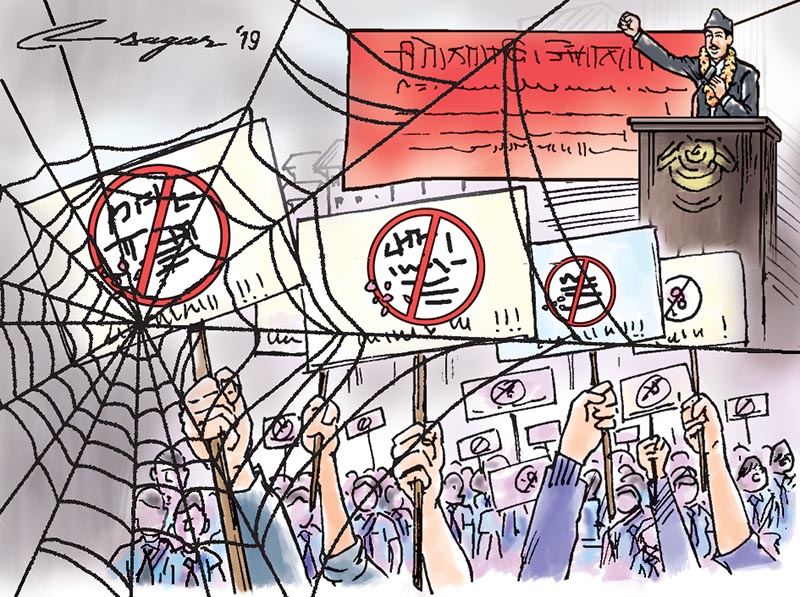Students’ unions: Do we need them now?
During the FSU election, none of the students’ unions includes the concerns and problems of the students. Rather their agenda read like a political manifesto. An FSU election is similar to a mini election of the political parties
Depending on the country, the purpose, assembly, method and implementation of a students’ union vary. Universally, the purpose of a students’ union (other countries) or students’ government (United States) is to have the representation of fellow students in some way. In fact, students’ unions are run by students, independent of an educational facility. The purpose of these organisations is to represent students both within the institution and outside, including on local and national issues. Students’ unions are also responsible for providing a variety of services to students.
Students’ unions can address a wide range of issues from the welfare of students to social issues and from the curriculum to the menu of the university cafeteria. Students’ unions are often also responsible for maintaining the student culture, from parties to housing and tutoring. Depending on the organisation’s makeup, students can get involved in the union by becoming active in a committee, by attending councils and general meetings, or by becoming an elected officer.
Now let’s talk about Nepal. The Jayatu Sanskritam rebellion in 1947 was the first students’ uprising, in which predominantly Brahmin students of a Sanskrit language school went on an agitation for modernising the curriculum. The role of the students was to create awareness among the people and to spread political consciousness as the beginning of democracy.
Since then, there have been more than two dozen students’ unions in Nepal, which are driven by both major and minor political parties and groups.
And the agendas of these parties have always been in favour of their head party rather than raising a voice for students’ welfare. These students’ unions hold the flags of their political parties and run along the party principles.
In Nepal, the students’ unions are just politicised bodies and often serve as a training ground for aspiring politicians. Students’ unions generally have similar objectives irrespective of the extent of politicisation. The education sector has been heavily influenced by politics. The unions never raise the important agendas of the students. No radical change has resulted in the education field due to the students’ union. Though they stand as a students’ union, their root is the political party and it is just like any other sister wing.
The political parties have intentionally sustained a structure of this sort to maintain their high-handedness in the power game. Sad but true, many youths of Nepal have become victims of political servitude in various ways with growing unemployment in the country. With high ambitions, they become ready to work under their dictum by often compromising their values and integrity.
It is really painful to note that the students’ unions in Nepal have made the system handicapped and dysfunctional. Perhaps, the education sector has been the hardest hit in present day Nepal. Frequent closure of educational institutions to get petty demands met by the partisan students’ unions was rife in the past although this has slightly got reduced in recent times.
Ranging from padlocking the Vice Chancellor’s office in the university to vandalising the academic departments for not getting good marks in the exam, such unions have shown their true face plenty of times, leaving a negative impression upon the non-partisan young minds.
In fact, they have practised politics to exacerbate chaos and anarchy in the country. The situation could have been different, had they taken a constructive path to direct their leadership towards the welfare of students.
Almost every campus in Nepal has at least half a dozen students’ unions that fight and argue with each other unnecessarily, from which it is apparent that they are not fighting for the betterment and management of the education system.
As loyal cadres of their parties, they leave no stone unturned to please their senior leaders. No union election has ever been held without a fight. They cannot tolerate the presence of another group of students, and are all out to grab power. To this extent, they have often resorted to violence, extortion and other anti-social activities. Rather than press the parties to follow the vision of national development, they opt to dance to the tune of their main leaders. We believe that universities produce qualified and skilled manpower that can lay the foundation for development, but the students’ unions are ruining everything.
Why are students’ unions necessary in contemporary times? Their significance during the periods of political turmoil in Nepal cannot be underestimated.
Their contribution and sacrifices were crucial during the different political changes in the history of Nepal. But the question is, if the unions were formed simply to raise the agendas and issues of their party, then, almost all the demands raised by the political parties have already been accomplished. So why is there a need of these students unions now? Why can’t they leave the students’ unions and enter politics directly?
During the election of the Free Students’ Unions, none of the students’ unions includes the concerns and problems of the students. Rather their agenda read like a political manifesto. An FSU election is similar to a mini election of the political parties to measure their popularity among the youths.






